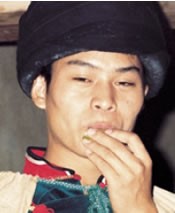The Depo also call themselves Adou or Adoupuo. Neighboring people call them Gan Yi, which is not the same as the Eastern Nasu group profiled in Operation China. The Eastern Nasu are also commonly called Gani. The Chinese character for Gan Yi means "sweet Yi," while the character used for the Gani means "dry Yi." The Depo have largely been assimilated by the Eastern Nasu.
This tribe claims to have been migrating for most of their past. They say they originally lived in the Zhaotong area of northeast Yunnan Province before moving south to Dongchuan. "Some time later they moved again - most of them going to Sichuan, but some of them crossing Luquan to eastern Wuding County." For centuries the Depo have been slaves to the Eastern Nasu. Today, their language and customs are almost identical to their former masters'.
One of the greatest festivals celebrated by the different Yi groups is the New Rice Festival, which takes place in the eighth month of the lunar calendar every year. The people celebrate the end of the rice harvest by drinking alcohol, singing, and dancing. On three different days in the sixth lunar month the Depo celebrate the Plum Raising Festival. They test the ripeness of their plums and also use the event as an excuse to get drunk, dance, and let their hair down.
Wuding and Luquan counties, where the Depo live, have been thoroughly evangelized and contain one of the highest concentrations of Christians in all of China. In the past, animals, rivers, trees, and even rocks were worshiped by the Depo. They believed that these natural objects were sources of spiritual power. They also believed that the spirits of animals could "bite" a person, so they made regular offerings to placate them.
A relatively high percentage of Depo believe in Christ, especially among those living in the highly evangelized Fawo District of Wuding County in Yunnan Province. The Depo in Sichuan have had less exposure to the gospel.
Pray for the Holy Spirit to move many Depo Christ followers to spread his fragrance to every Depo family and village.
Pray for the Depo church to be defined by discipleship, love and joy.
Pray for revival fire to consume their churches and spread to neighboring peoples.
Pray for God s protection and goodness to permeate Depo families.
Scripture Prayers for the Depo in China.
Operation China, Asia Harvest, Copyrighted Used with permission.
| Profile Source: Joshua Project |










